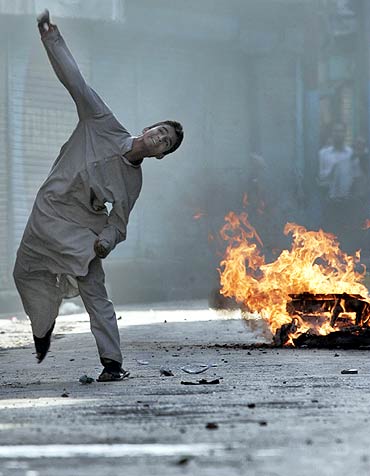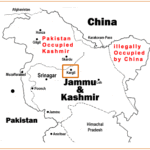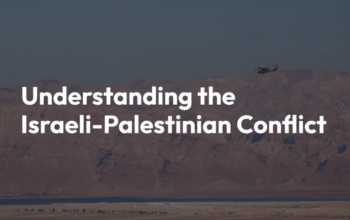India and Kashmir, well if we had a chance to ask a question to some of the greatest brains in the world who can solve any problem, like Albert Einstein, I would ask him to give a solution for the K-word. Rather, I should ask not for the solution, but should ask what the problem is ! Lets find out what we are trying to fix. More significant question, is there anything that can be fixed ? If yes, what’s that ?
So much perplexed and dynamic are the day-to-day and macro happenings of this part of the world that some recent findings and news articles would show the patterns that can lead to know more about the situation at ground zero.

Young Kashmiris in their 20s¸ who grew up in the violent years of militancy and are more politically educated than their counterparts elsewhere in India !!
“Did you hear anyone raising slogans on the streets that they want jobs? Our aspirations are entirely political, it is not an economic issue or a social issue,” said Tawqeer Hussain, a post-graduate journalism student at the Islamic University of Science and Technology in Avantipora, 25 km outside Srinagar.
But, observe this another fact published in The Hindu:
Long queues are seen outside the Subsidiary Training Centre (STC) of the BSF at Humhama near Srinagar International Airport. For just 179 posts of BSF constables, the authorities have received thousands of applications in Baramulla, Kupwara, Bandipore, Anantnag and Srinagar. “It is difficult to deal with this situation as the youths are desperate to get into the force,” a BSF officer dealing with recruitments told The Hindu. They were surprised to see post-graduates and graduates applying for the position of constable. Thousands of Kashmiri youth have in the past two weeks been queuing up for recruitment in the Border Security Force (BSF). For the Central Reserve Police Force (CRPF) also, the number of job-seekers is soaring. At the Srinagar centre alone, over 3,000 applications were received of whom 800 were shortlisted for the interview. “Of the shortlisted applications, 15 were post-graduates and 35 graduates,” said the official.
Ironical it is, the jobs they selected to apply for. The very BSF and CRPF they fight and resist ! May be they want to enter and clean the forces ? I hope so!
The other aspects : These are all part of the efforts under way to meet the challenge of what is increasingly being viewed as the Valley’s explosive demography, from the Government (employment package proposed by the Chief Minister), NGOs, inspired citizens trying to make 200 Kashmiri Entrepreneurs, etc. The projection for 2011 is 66 per cent, which may mean nearly 700,000 people between the ages of 18 and 30. From policemen to policy wonks and politicians, everyone is talking about Kashmir’s problematic “youth bulge.”
After all, youth will be youth, be it in a valley or on the plains ! They are incredible capable, little short of direction and can do wonders if properly nurtured. Else, you get stones pelted be it on the roads or on the Facebook !
Kashmir has 6,000 unemployed doctors and 2,000 unemployed bio-technologists. Over 78,000 people in the 18-25 age group have some kind of computer education but most of them have no jobs. Underemployment is common.
Now again, the irony returns : Despite the antipathy (if some of you reading still believes that there is no antipathy at all, I am sorry, but you are probably wrong) towards India, government jobs remain the only kind that the Kashmiri youth want, simply because they promise a paycheck at the end of the month, come what may.
Azadi is what youngsters want to talk about, not jobs. “India wants to own us,” said Saeed Sarmad, a 21-year-old B. Tech student at the same university, “but the problem is we don’t want to be part of it (read India), we have never been a part of it. We want recognition of our own identity. We want azadi”. The small built and delicate-looking computer science student was not a stone-thrower. “I am a coward; I can’t go out and face bullets,” he said when I met him and his friends at the scenic hillside campus of the university. He was not lacking in confidence, though. He told me Kashmir would win its azadi as early as “next year.”
Do you think you found the problem ? I should be having a cruel smile if that’s so. There was, and will always be room for creative interpretation of the term azadi as it meant different things to different people. To most young Kashmiris, however, azadi has no meaning other than freedom — from India(and from Pakistan too).
But what azadi actually means beyond “freedom” is not always clear to everyone, and especially to the youth, and perhaps this is where an opportunity still remains for building bridges with Kashmir. A start, said IUST Vice-Chancellor Siddiq Wahid, can be made by approaching the idea differently.

“Rather than ask what azadi is, ask what azadi is not. Young Kashmiris understand better what the absence of azadi means,” said Dr. Wahid. For Kashmiri youth, their lack of freedom hangs heavy in leading their lives in the shadow of a heavy military presence. “All my life, I have known only guns, bullets, curfews, check posts. Mine is the fourth generation of Kashmiris living in this uncertainty. I don’t want to pass this on to the fifth,” said Tawqueer. “Giving people jobs is a step,” said one of them, “but it cannot be a solution.”
Kashmir and India, well if we have a chance to call them together, I would want us to do that for the next five generations to come.
Jai Hind.
(The title of the post is inspired from one of the editorial page articles in The Hindu dated December 8th, 2010).
Related Posts
Hi there! I’m Sethu, your go-to guy for all things tech, travel, internet, movies, and business tips. I love sharing insights and stories that make life more interesting. Let’s explore the world together, one article at a time!










